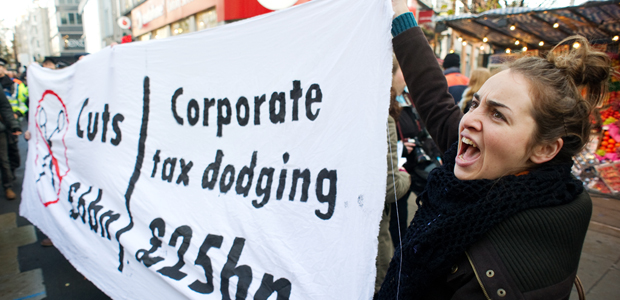HMRC ‘bent rules’ for big firms
A report into the HM Revenue & Customs found “specific and systemic” failures in the way deals are done with companies, allowing tax bills to be negotiated at a loss to the taxpayer.

The report from the Commons public accounts committee said an “unduly cosy” relationship between the HMRC and major companies had resulted in the tax collector bending the rules so big companies could pay less.
HMRC civil servants today face a grilling from MPs following the report about why they “chose to depart from normal governance procedures” by allowing the same senior officials to both negotiate and approve such deals.
The committee said there could be £25bn of outstanding unresolved tax bills as a result of questionable deals.
The report also suggests that the details of such deals were hidden from the watchdog. During the investigation officials claimed they could not discuss details with the committee because of confidentiality agreements – and according to the public accounts committee, gave “imprecise, inconsistent and potentially misleading” answers.
The potential cost to the taxpayer is officially put at £8m but according to a whistleblower the total sum could be as high as £20m.
The whistleblower’s claim has been denied by the HMRC. A spokesman said: “This assertion, based on untested, leaked information, is without foundation.”
He continued: “The report is based on partial information, inaccurate opinion and some misunderstanding of facts.
“We agree that public confidence in our processes is important, and as we have already informed the public accounts committee, we propose to make further improvements to our governance and to increase transparency about our work with large business.”
Top tax official blamed
The inquiry into HMRC has been ongoing and at one stage saw the committee chair accuse the country’s top tax official, Dave Hartnett, of lying. The report says the Mr Harnett alone enjoyed 107 dinners and lunches with companies, tax lawyers and advisers over two years.
Mr Hartnett, who has announced he will retire in the summer of 2012, admitted that an error led him to sign off on one tax avoidance dispute. He allowed banking giant Goldman Sachs to avoid paying a multi-million pound interest bill on unpaid tax on bonuses because he was wrongly advised there was a “legal impediment” to collecting it.
However the committee concluded that the deal with Goldman Sachs was done “without legal advice” and without an official note being taken of the meeting, with officials relying on the firm’s records.
It also found that the relatively junior official responsible for the mistake in the Goldman deal had been punished by losing a bonus.
An HMRC spokesman said the error made in the Goldman Sachs case was a one-off, and not indicative of a wider, systemic failure.
UK Uncut
Richard Stein, from solicitors Leigh Day & Co, which is acting for UK Uncut Legal Action, said the group wrote to the the HMRC in October asking them to quash the Goldmans Sachs deal to “reclaim the millions unpaid in taxes from one of the world’s richest banks but received no response. We chased again in November and they claimed they needed more time,” he added.
“They have now replied with what we feel is an extremely weak argument as to why this decision cannot be reversed. Therefore, we will now progress this legal action and issue proceedings in the high court.”
UK Uncut Legal Action Director Tim Street said the group has raised nearly £10,000 in two weeks from the general public to support its legal action, which has won backing from unions and anti-poverty charities.
Exchequer Secretary to the Treasury David Gauke said: “Last year HMRC brought in record revenues for the UK.
“This included £13.9bn that would have been lost to the Exchequer without the hard work of its staff, over half of which was secured directly from large business.”
-
Latest news
-
‘I violated my moral compass working for Trump,’ former lawyer testifies3m

-
Working class creatives in film and TV at lowest level in decade5m

-
Israeli police investigating attack on Gaza aid convoy4m

-
Biden announces major tariff increase on Chinese-imported green tech3m

-
‘If NHS can afford it, people with obesity should have Semaglutide,’ says weight loss expert5m

-




